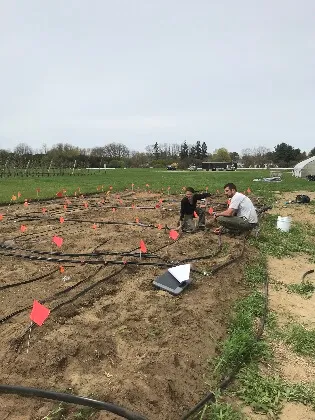How are the region's farmers dealing with the new normal that growing seasons present? What happens in an excessively wet spring? A near-drought July? When the harvest season sees frequent deluges?
These are some of the questions asked by Center's Farming & Climate Change Coordinator Joshua Faulkner, along with a team of collaborators from the University of Vermont, the USDA Northeast Climate Hub, and around the region.
They also wondered what Extension personnel and researchers can learn from the farmers experiencing these conditions, and use that knowledge to develop a peer-learning approach so that farmers and growers can learn from each other. Through many conversations, recruitment of farmers, research and analysis, the Climate Adaptation Fellows program was developed.
Its website launched in October 2019, and is available at https://www.adaptationfellows.net/.
What is the purpose of sharing this information?
"The Climate Adaptation Fellowship curriculum provides farmers, foresters, and advisors with the information they need to adapt to climate change. We also work to bring climate change into advisors’ outreach programs, and talk about climate change with peers and colleagues. The curriculum is designed to increase participant knowledge, and empower broad adoption of climate adaptation practices in the northeastern United States."
Coordinator Joshua Faulkner says, " I’m most excited to see this program link new and less-experienced farmers with more-seasoned farmers who have found ways to successfully adapt to some of the effects of climate change, and harness and disseminate their knowledge and experience. We know that peer-to-peer learning is one of the most effective ways to improve management practices in agriculture, and that is at the core of this project. I’m also excited that this curriculum has built-in opportunities to test innovative practices on participants’ farms, and evaluate how those practice work or don’t work toward making specific enterprises more resilient."
What's most relevant for Vermont growers?
This curriculum is tailored specifically for the Northeast, and the climate change challenges that farmers in this region are facing. Within the region, Vermont farmers are some of the most-affected by increasing annual rainfall and more frequent heavy storms. As such, this curriculum will be especially useful for our growers.
Team members are currently seeking funding to pilot this curriculum with vegetable farmers in the Northeast. Launching a pilot will allow us to test-drive the program, get feedback from growers, and understand what components of it work really well, and what can be improved for future iterations.
Agricultural research and outreach professional colleagues may be interested to join us at UVM on December 18-19 for the Northeast Specialty Crop Water Symposium for an in-depth look at the current realities around both excess water and drought, consider what the research needs are, and connect with other professionals around future possibilities.
Originally published in the Center's Fresh from the Field October 2019 newsletter.
